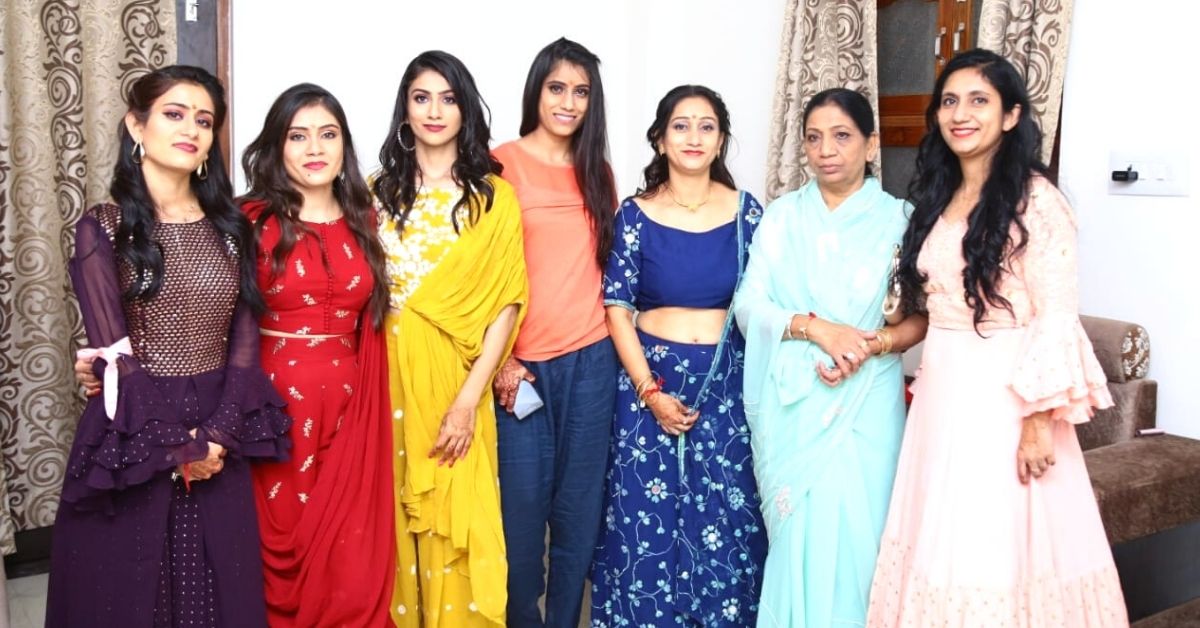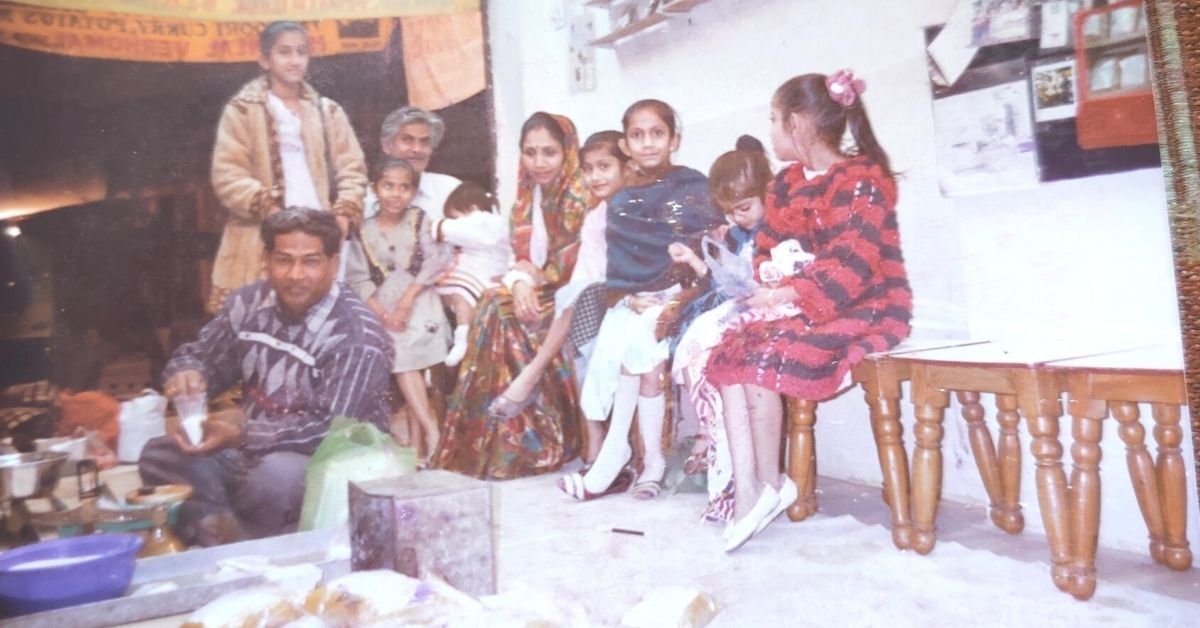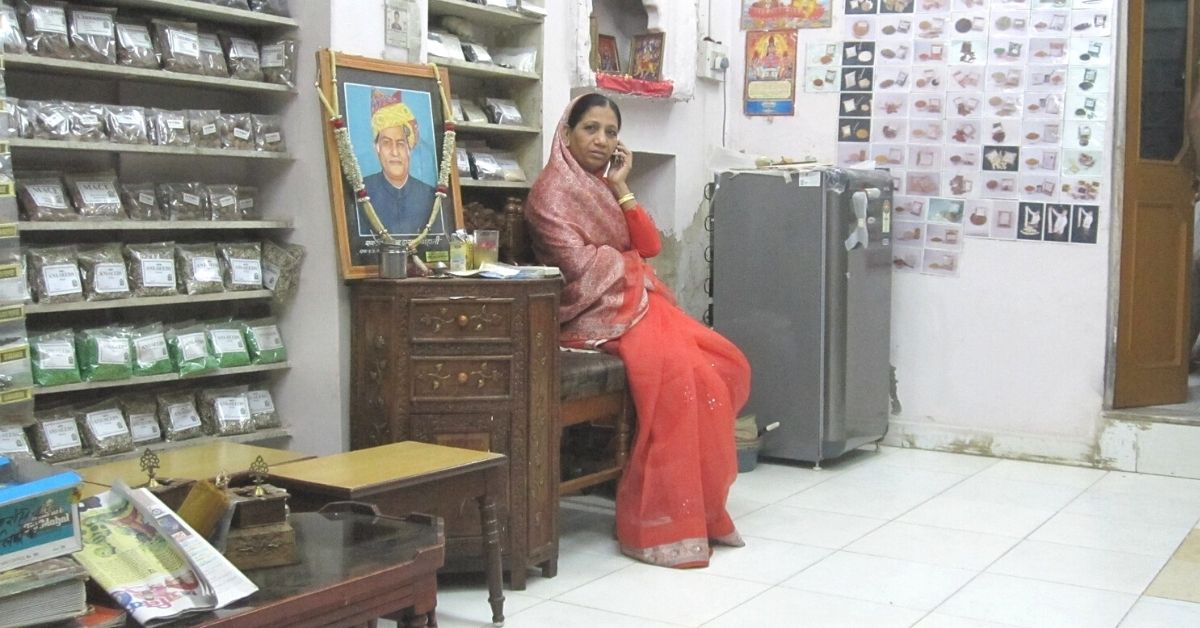How a Single Mom & 7 Daughters Made Jodhpur Man’s Spice Legacy ‘World Famous’
Mohanlal and Bhagwanti Vermohal founded MV Spices in Jodhpur in the 70s. What started as a handful of handmade spices being sold on a bed sheet outside Mehrangarh Fort is today a world-famous spice business with four stores that offer over 120 products, being helmed by eight gritty women

If you go to Jodhpur, Rajasthan and happen to visit MV Spices as part of your tour, you will find the store, located in the Clock Tower area, brimming with curious foreigners and tourists. Step inside and you will find a few young girls selling a variety of spices, which especially cater to the tastes of visitors from outside India.
But it’s not the spices alone that make the store stand out. There’s a special story behind what makes MV Spices truly unique.
As Bhagwanti, wife of late Mohanlal Verhomal, co-founder of the business, tells The Better India, “My daughters and I are the only women in the spice business in Jodhpur.”
Bhagwanti and Mohanlal started the spice business in the late 1970s, with Mohanlal’s ambition being to sell products to foreigners and tourists.
“I married Mohanlal at the age of 22. He owned a grocery shop back then, but it suffered heavy losses as many relatives and acquaintances sourced groceries from the shop on credit and never paid for it,” she recalls.

Soon after marriage, Bhagwanti gave birth to three daughters in a row. The couple soon began to feel a financial burden as their family grew. “I convinced my husband that such losses cannot continue as we had daughters to raise, and that our living expenses would only increase over the years,” she says.
After months of convincing, Mohanlal agreed to shut shop and look for an alternative business.
Labour of love

“I suggested we make traditional spices at home and sell them to tourists in Jodhpur. Around the time my fourth daughter was born, I began making 50 gram packets of spices at home and handed them to my husband to sell in the market,” Bhagwanti says.
Th 63-year-old adds that the business started with no significant capital in hand. “Mohanlal started selling the spices at the entrance of the famous Mehrangarh Fort. He would spread a bed sheet along the street and display the spices on it,” she says.
Bhagwanti says, “One day, a guard at the fort asked Mohanlal to meet Maharaja Gaj Singh. The king decided to dedicate a space within the fort where Mohanlal could set up shop in return for a monthly rent.”
Thanks to this, the shop saw increased visibility and business picked up. In 1980, the couple had enough finances to buy a shop near the Clock Tower at the vegetable market and named it MV Spices.
“Tourists and foreigners appreciated the spices for their quality and taste. Our products were handmade and had no adulteration, and the raw materials were of high quality. The practice of selecting quality spices continues to date,” she says.
Bhagwanti says the mix of the spices is tweaked every now and then, considering the taste of the foreigners. “For example, the proportion of black pepper in garam masala is comparatively less than used for Indian taste buds. Such small changes helped foreigners accept the products,” she adds.
Overcoming grief

In 2004, tragedy struck when Mohanlal passed away suddenly due to a heart attack, making Bhagwanti the sole proprietor of the business.
“We had seven daughters by then and no son. Everyone, including my in-laws, believed the shop would shut as men traditionally owned and operated the businesses. They advised me to close operations as it would become difficult to manage my children and a business. Some relatives suggested I hand over the affairs in return for monthly rent,” Bhagwanti says.
But she refused all such offers and decided to continue the business by herself. “Mohanlal and I would toil from 6 am until 9 pm to establish the business. It was my husband’s dream, and I needed to earn money to raise my daughters. There was no way I was going to give up on it,” she says.
But as bias reared its ugly head, Bhagwanti found that standing up for her beliefs at home was much easier than what was waiting for her outside in society.
“I was the only woman in the business, and competitors started spreading rumours and misinformation about me. They threatened us and even misguided tourists. Many of them named their shops starting with the letter ‘M’ to confuse customers. They tried to tear us down just because I was a woman,” she recalls.
However, not one to bag down, she asked her four elder daughters to manage the shop near the Clock Tower, and she took charge of the business at the fort.
Today, the family owns four shops that offer over 120 plus products such as vegetable masala, curry masala, tea masala, herbal masala, chicken masala and others. The handmade spices have made a mark across the globe — 95 per cent of MV Spices’ products are sold to foreigners, or are exported.
The shops are managed by seven daughters – Usha, Poonam, Neelam, Nikki, Kavita, Rutu and Priya.
Neelam, manager of the business, says the aggressive gender bias has not reduced over time. “The men in the area did not want us in the market then, and the situation has not changed much since. Our world turned upside down overnight after our father’s death. We were in shock at his sudden demise. But my mother dealt with the loss and remained strong-headed to continue the business. Her vision and belief in herself make us all proud,” she says.
Neelam says that before their father passed away, the daughters had never been involved in the business. “We did not know about spices and how to run a business. But we started taking responsibilities to help our mother and worked as instructed,” she says.
A relation of trust
She adds that taking charge of the business made her know more about her father. “Our father was always busy, and we were engrossed in academics and personal lives. We didn’t have much time to bond. But managing the shop helped me understand my father better,” she says, adding that old customers often visit the shop to meet Mohanlal, and miss his presence when they find out that he is no more.

Recalling an incident, Neelam says, “Once, a lady from the United Kingdom visited the shop and narrated an experience about her previous visit. My father was about to have lunch when she arrived. He offered her and other tourists his lunch box and shared food. The lady admitted that she was hungry and was moved by his gesture. On another occasion, Mohanlal rode her to a local food joint to give her an experience of authentic street food.”
She adds, “Such stories of my father’s kindness and his strong bond with customers show how dedicated, committed and passionate he was towards his business.”
A UK-based customer, Claire, says, “One of our guides took us to the spice shop as a part of the city tour. The shop seemed average at first, but the experience was amazing. The girls explained to us how the spices are used in cooking. They even guided us with recipes and cooking instructions via email.”
Meanwhile, Neelam says that their store offers something different to foreign visitors. “They appreciate that we take the time out to interact with them, tell them about the spices in detail, and that we speak in English. They’re also more comfortable with us because we’re women.”
“We always send the courier of spices on credit to foreign countries and ask for payment only after delivery. If the products fail to reach, we do not charge. It is what my father practised, and we continue the same,” she explains, adding, “Such trust and belief has helped us retain customers for years.”
She says their business continues to use word of mouth to promote itself, and the family has not resorted to digital media marketing or other advertising means. “Our business has thrived solely by traditional means. Even when we travel abroad or to other parts of India, we carry packets of spices and try to promote them,” she says.
Meanwhile, Bhagwanti is confident that her daughters will take the business to new heights. “They know the hard work that has been put in for years and know the business dynamics. I am sure the shops are in safe hands,” she adds.
Edited by Divya Sethu
If you found our stories insightful, informative, or even just enjoyable, we invite you to consider making a voluntary payment to support the work we do at The Better India. Your contribution helps us continue producing quality content that educates, inspires, and drives positive change.
Choose one of the payment options below for your contribution-
By paying for the stories you value, you directly contribute to sustaining our efforts focused on making a difference in the world. Together, let’s ensure that impactful stories continue to be told and shared, enriching lives and communities alike.
Thank you for your support. Here are some frequently asked questions you might find helpful to know why you are contributing?


This story made me
-
97
-
121
-
89
-
167











